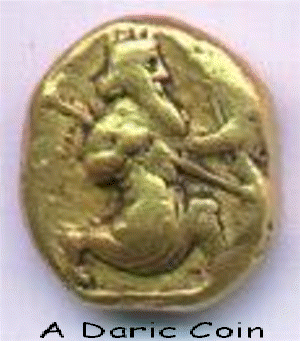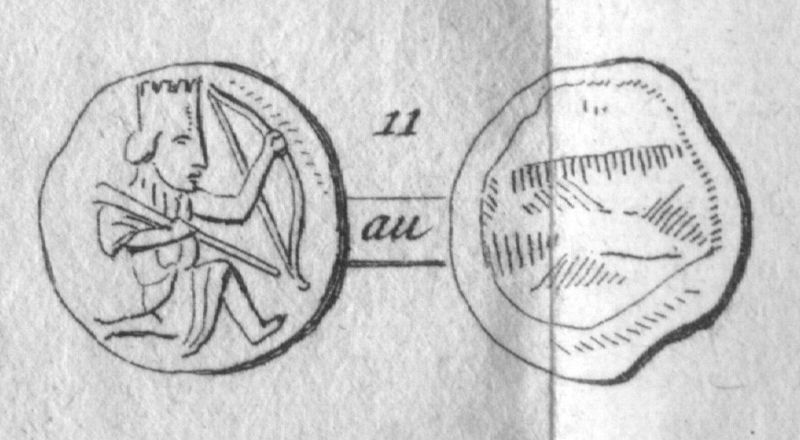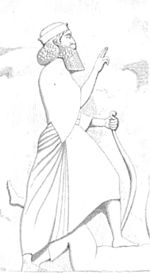
 |
Freethought & Rationalism ArchiveThe archives are read only. |
|
|
#1 | ||
|
Senior Member
Join Date: Mar 2007
Location: Texas
Posts: 976
|
Per the Bible, Darius the Mede was the king of the Medes who ruled over Babylon immediately after it was overthrown by he and Cyrus. He ruled for six years before Cyrus became king over all of Persia and there became one person only with the title of "king", all other former kings being called "governor."
Darius the Mede as also, however, the grandson of Nebuchadnezzar through a state marriage between the daughter of Nebuchadnezzar and the king of the Medes, "Ahasuerus" who was also the father of Astyages. Thus Darius the Mede and Astyages were brothers, and Cyrus, who was married to the daughter of Astyages was thus the nephew-in-law of Darius the Mede. The Medes were stronger than the Persians, dynastically, but with no male heir from the Medes at this time, the royal line went through the daughter of Astyages who was married to Cyrus so the children of Cyrus were the royal line for the Medes now. Thus Darius abdictated to Cyrus so that the royal lines of the Medes and the Persians would become one. Apparently, though, Darius continued as governor ruling over Babylon for the next 8 years until he died, Cambyses succeeding him for one year as co-ruler with Cyrus, until Cyrus died the next year. During the six-year rule of Darius, the Mede, the Jews were still in bondage. It was not until the rule of Cyrus over the entire kingdom that the Jews were released to return to their homeland and rebuild their city and temple, events specifically associated with Cyrus and not Darius, the Mede. Isa 44:28 the One saying of Cyrus, ‘He is my shepherd, and all that I delight in he will completely carry out’; even in [my] saying of Jerusalem, ‘She will be rebuilt,’ and of the temple, ‘You will have your foundation laid.’” 70 years ending Neo-Babylonian Empire: Since Darius, the Mede was the grandson of Nebuchadnezzar and thus the legitimate heir to the Babylonian throne, in addition to Nabonidus still away at Borsippa, the Neo-Babylonian kingship was not considered to have ended until Cyrus himself began to rule over Babylon. Thus the 70 years prophesied that the last deportees would remain off their land was not fulfilled when Babylon fell to the Medes and Persians, but only when Cyrus began to rule. Thus the Bible specifically states it is only when the "royalty of PERSIA" begins to rule that the 70 years are up. The "royalty of PERSIA" excludes, Darius, the "MEDE". 2 Chronicles 36:20 "Furthermore, he carried off those remaining from the sword captive to Babylon, and they came to be servants to him and his sons until the royalty of Persia began to reign; 21 to fulfill Jehovah’s word by the mouth of Jeremiah, until the land had paid off its sabbaths. All the days of lying desolated it kept sabbath, to fulfill seventy years." "Those remaining from the sword" is a reference to those who escaped from the sword of Nebuchadnezzar that came against those who had run down to Egypt and refused to leave. (Jer 44:14,28). The 70-year interval from the 23rd of Nebuchadnezzar, the year of the last deportation (Jer. 52:30) to the 1st of Cyrus is a key Biblical chronological interval for connecting the Bible's timeline into the secular timeline during the time of Nebuchadnezzar, a rather well-documented period archaeologically speaking. DARIUS THE MEDE IN SECULAR RECORDS: Darius the Mede does not appear directly as a named king in secular records, but he is implied by his activities. For instance, in the Cyrus Cylinder there is a mention of Ugbaru and Gubaru; one conquering Babylon with Cyrus then dying and the other organizing the empire into satrapies. In the Bible both deeds are ascribed to Darius, the Mede. Further, while his rulership years were always considered a focus of debate, that he was an actual person hasn't been questioned until very late, as evidenced by his historical actions and presence in a timeline published by none other than Sir Isaac Newton himself in his "A Short Chronicle." Quote:
"These critics correctly assert that the daric was a coin of the Persian Empire (probably derived from Darius the Mede)." Origin of Daric  This is a "daric" likely coined by Darius I, the Persian -- notice the beard and crown type.  This is likely the original "daric" coined by Darius, the Mede, King of Babylon. There is no distinctive beard and the crown not the usual Persian crown. Quote:
LG47 |
||
|
|
|
|
#2 |
|
Junior Member
Join Date: Feb 2007
Location: New York
Posts: 83
|
Sounds more like Daniel got confused about the order of Persian kings. Darius was a Persian king whose rule followed Cyrus. He wasn't a Mede king who ruled Babylon because the Medes were already thoroughly defeated by Cyrus by the time the Persian Empire annexed Babylon. The Medes thereafter functioned as an aristocratic ethnic group within the Persian Empire, but their king was the same as the Persian king.
|
|
|
|
|
#3 | |
|
Senior Member
Join Date: Mar 2007
Location: Texas
Posts: 976
|
Quote:
So, no, the Bible is not confused. Daniel wasn't alive during the reign of Darius, the Great but he was still in bondage at Babylon during the reign of Darius, the Mede. When Babylon was conquered they were conquered by the coalition between the "MEDES and the Persians" with the Medes the more dominant empire. In fact, the Greeks called the Persians the "Medes" primarily. But then the empire of the Medes and the Persians were consolidated under one major king, the first being Cyrus and the kingdom of the Medes and the Persians came under a united Persian empire with the first great king being Cyrus, who was considered by now like a god and great conquerer. The Medes didn't mind since the royal line of the Medes came through the children of Cyrus, who was married to the daughter of Astyages, the king of the Medes and brother to Darius, the Mede. LG47 |
|
|
|
|
|
#4 | ||||||||||
|
Veteran Member
Join Date: Jan 2001
Location: In the dark places of the world
Posts: 8,093
|
Quote:
Quote:
Quote:
Quote:
Quote:
Quote:
2. The existence of Darius the Mede has been in question for quite a long time. Quote:
Your solitary source wanting to try and connect the coinage to the fictional DTM is - what? - a solitary minister writing an article for an apologetics website. Here is what an actual source looks like: Britannica: Quote:
Quote:
Quote:
|
||||||||||
|
|
|
|
#5 | |||
|
Veteran Member
Join Date: Jan 2001
Location: In the dark places of the world
Posts: 8,093
|
Quote:
1. Newton is not a historical source. Quote:
Quote:
 The Persians were always the senior power. Media was always the junior partner in the military and political relationship; Persia was the clear senior. Describing a partnership by its junior member would be confusing and inaccurate. It was always Persia who ultimately held the reins of power – recall that Cyrus had conquered the Medes in 550 BCE and made them subject to Persia. The most accurate description of the invasion of Babylon would be “Invasion of the Persians”. The second most accurate would be to call it “invasion of the Persians and Medes”. The least accurate, and actually misleading, way to refer to it would be “invasion of the Medes”. Yet that is the description we see in Isaiah and Jeremiah. And by the time of Darius, the Medians’ special status as co-equals in the empire had already evaporated, and they were subjects like other conquered peoples. Like most such relationships, it existed only at the whim of the senior partner, and was never meant to last. The Median equality ended several years later, when Darius I usurped the throne. The Medes rose unsuccessfully in revolt (522-521 BCE), were crushed, and then lost such privileged status as they had enjoyed. |
|||
|
|
|
|
#6 | ||||||||
|
Senior Member
Join Date: Mar 2007
Location: Texas
Posts: 976
|
Quote:
Further, the VAT4956 forces the expansion of the Neo-Babylonian Period by 26 years as well. The Cyrus Cylinder, Nabonidus Chronicle and Babylonian Chronicle are known to be late Persian documents (copies) and so are presumed to have revisions. There is no way you can overcome the astronomical data, so the old chronology is dismissed and you have 26 years of NB history to now fill in. A cryptic reference by Josephus is made where he mentions a 54-year period in association with Cyrus. This is a tip off he was referring to the beginning of the 20-year rulership of Cyrus that occurred before he became king in Babylon. Josephus' reference to the fall of "Tyre" is considered an actual cryptic reference to the fall of Babylon in relation to the 20-year rule of Cyrus. The 54 years are significant since Cyrus began his 20-year rule over Persia before becoming king over all of Persia including Babylon 54 years after the fall of Jerusalem. Thus there are two intervals of desolation years involved with Cyrus, one 50 years and one 70 years, both of which are mentioned by Josephus in his last work, Against Apion (1:19, 1:21), thus he is playing with the numbers. Here's how the numbers "coincidentally" line up when comparing the seige of Tyre for 13 years beginning the 7th year of "Nebuchadnezzar" compared to the fall of Babylon after 13 years when it begins instead in the 7th year of Nabonidus. That is, if Cyrus begins his rule in the 6th of Nabonidus for 20 years, you have a period of 25 years. If you begin a 13-year seige of Babylon in the 7th year of Nabonidus, with the fall of Babylon at the end of the 13-year period, then that removes 14 years from the 25, leaving 11 years. When you subtract the first 5 years from the 11, you still have six years left before Cyrus comes to the throne. Those six years are confirmed as the rule of Darius the Mede. Quote:
 Quote:
Quote:
Quote:
Quote:
Quote:
http://www.usu.edu/markdamen/1320His...rs/02HEROD.htm Quote:
 Thanks for the outdated history lesson, though, much appreciated. Post the double-dated discoveries in the VAT4956, all the old history has to be updated. The rule of Darius the Mede was suppressed when 26 years of Neo-Babylonian kings were removed to use to expand the rulerships of some of the Persian kings. LG47 |
||||||||
|
|
|
|
#7 | |
|
Senior Member
Join Date: Mar 2007
Location: Texas
Posts: 976
|
DARIUS, THE MEDE:
Quote:
|
|
|
|
|
|
#8 | |||||||||||||||
|
Veteran Member
Join Date: Jan 2001
Location: In the dark places of the world
Posts: 8,093
|
Quote:
Quote:
Further, while his rulership years were always considered a focus of debate, that he was an actual person hasn't been questioned until very late, as evidenced by his historical actions and presence in a timeline published by none other than Sir Isaac Newton himself You'll find that I am the *last* person that you want to be dishonest or sloppy with. Quote:
2. You have no historical source that says he did. All you have is Newton (not a historical source) and a minister writing an apologetics article who - like you - assumed his conclusion. Quote:
Quote:
Quote:
Quote:
Quote:
By the victory in 550 of the Persian chief Cyrus II the Great over his suzerain, Astyages of Media, the Medes were made subject to the Persians. In the new Achaemenian Empire they retained a prominent position; in honour and war they stood next to the Persians, and their court ceremonial was adopted by the new sovereigns, who in the summer months resided in Ecbatana. Note the clear power shift to Persia. The Medes' favored status would last less than 30 years. Quote:
2. In the second place, you've only presented one source that uses both nationality terms together - and that source is the bible. But as indicated, there are mistakes in bible chronology, so trying to use the bible to prove the bible won't work here; 3. In the third place, you're flat-out wrong in your claim that these terms always appear in the order "Medes and Persians" -- and apparently don't know your own bible: EST 1:19 If it please the king, let there go a royal commandment from him, and let it be written among the laws of the Persians and the Medes, that it be not altered, That Vashti come no more before king Ahasuerus; and let the king give her royal estate unto another that is better than she. Some tin-pot messiah you are.  Quote:
2. I already gave you the source: Britannica. Quote:
2. Not that it matters, because the bible's history on this point is wrong anyhow. Quote:
Quote:
Quote:
Quote:
“Medes”, The Oxford Companion to the Bible. Edited by Bruce M. Metzger and Michael D. Coogan. Oxford University Press, 1993. Page 507. |
|||||||||||||||
|
|
|
|
#9 |
|
Veteran Member
Join Date: Jan 2001
Location: In the dark places of the world
Posts: 8,093
|
|
|
|
|
|
#10 | ||||||||
|
Senior Member
Join Date: Mar 2007
Location: Texas
Posts: 976
|
Quote:
Quote:
Quote:
Quote:
Quote:
Quote:
Quote:
Quote:
Thanks for your comments! Now about your THREE FAVORITE BIBLE CHRONOLOGY MISTAKES? I'm curious where your mindset is on this. ?? Well? Thanks! LG47 |
||||||||
|
|
| Thread Tools | Search this Thread |
|